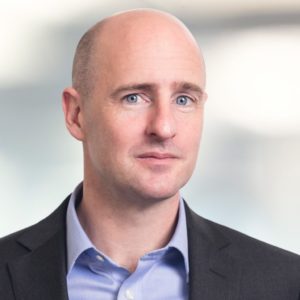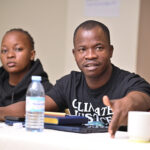This article was published more than 7 years ago.

The Fund for Global Human Rights kicked off 2018 with excitement and a renewed sense of determination. Nowhere is this greater than in London, where we are creating new capacity and opportunities for the Fund in Europe. With a new office, a new vision, and new staff (including myself), we are ready to promote the voices of and mobilize support for frontline human activists like never before.
I began as Director of the European Office at the end of 2017 and am thrilled to be taking on this role, at this moment in time, and with this set of colleagues.
I bring a diverse set of experiences in the human rights field to this challenge—as an activist, a grantmaker, a manager—as well as a personal commitment to justice and fairness. This background has instilled in me a deep appreciation of the Fund’s unique approach and work.
I began my career at Amnesty International, where I was a country specialist working in Turkey. I saw there how communities could be subjected to some of the worst abuses imaginable; but I also saw how local activists could help restore dignity and justice to these communities, paving the way to a better life. I will never forget working with Tahir Elçi, a Kurdish lawyer who worked for years with the families of people who had been killed or ‘disappeared’ during the conflict that had raged across his region. Against almost insurmountable odds, Tahir managed to secure prosecutions of those responsible and obtain compensation for families who had lost their loved ones.
After my time at Amnesty, I was fortunate to work with two leading private institutional funders, Oak Foundation and Open Society Foundations, that work to promote human rights globally. This allowed me to meet inspiring individuals and groups, and see how they were using a human rights framework to achieve lasting and positive change. In addition to a shared commitment to dignity and justice, these human rights defenders had many challenges in common, including a lack of resources to help sustain their activism and threats from the powerful actors opposed to their work.
This experience as a grantmaker helped me realise that what is most needed for lasting impact—and what is often most lacking—is support to local activists that is empowering and which allows them to lead with their own visions. Locally-led and rooted groups are best positioned to understand the contexts in which they operate, identify which issues are of greatest priority to their communities, and respond quickly to threats and opportunities. It is also these frontline activists who are most exposed to the dangers presented by this work and need support to protect themselves.
Another important discovery was the value of connecting local groups across countries and regions, so that they can access the thinking and lessons of others engaged in similar work elsewhere. Connecting and facilitating the transfer of ideas between groups has been one of the most worthwhile things that I’ve done in my career.
The Fund’s unique approach to grantmaking aligns with many of these lessons. Since making its first grant in 2003, the organization has gained a reputation as one of the most knowledgeable, innovative, and agile actors in grassroots philanthropy. Its trailblazing model involves: distributing flexible resources to activists, allowing them to be responsive to their contexts; taking calculated risks to support frontline groups that other donors cannot reach; and building close relationships with grantees that demonstrate commitment and trust. It also provides technical assistance and capacity-building support based on the real needs of grassroots activists, and facilitates peer-to-peer knowledge exchange and collaboration that strengthens the work of activists and builds bridges across borders. Last (but not least), it has a brilliant and talented staff that I am honoured to become one of.
Aside from this appreciation of its model and my new colleagues, there is another reason that I am keen to join the Fund now. At the end of 2015, Tahir Elçi—the Kurdish Turkish lawyer I met while at Amnesty—was shot and killed at a press event in his home city. In an awful irony, he died while reading a press statement in which he called for an end to the armed conflict that had recently reignited there.
As I look back on 2016 and 2017, it is hard not to see Tahir’s death as part of several ongoing and alarming trends: rising populism, resurgent authoritarianism and fundamentalism, and growing social inequality and violence. Human rights are under assault like never before, and at the Fund, I know that I am making the greatest difference I can to promote and support them.
At the same time, I remain hopeful in the face of these trends. Across the globe, people are mobilising and demonstrating with new energy. Human rights activists are experimenting and creating new ways to have impact. The world may have changed, but the need for human rights has never been greater.
In order to meet this moment, we need to find new ways to have impact, build new alliances with other movements, and speak in different ways to new audiences that we may have previously failed to connect with. The Fund, with its model and commitment to agility and innovation, is well positioned to meet these challenges and realize the opportunities that are out there.


